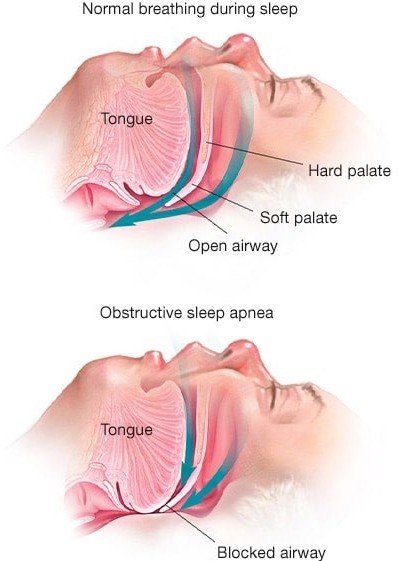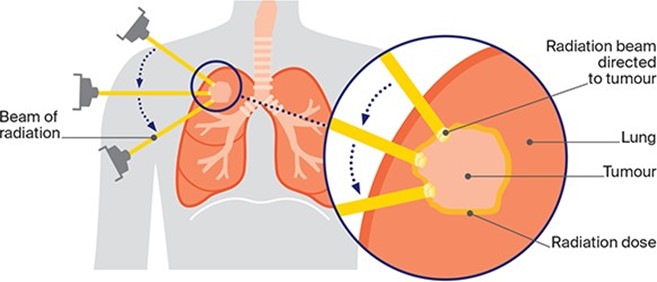A nurse is teaching a client who is obese and has obstructive sleep apnea how to decrease the number of nightly apneic episodes. Which of the following client statements indicates an understanding of the teaching?
"If I could lose about 50 pounds, I might stop having so many apneic episodes."
"I sleep better if I take a sleeping pill at night."
"It might help if I tried sleeping only on my back."
"I should get a humidifier to run at my bedside at night."
The Correct Answer is A
This statement indicates an understanding of the teaching, as weight loss is one of the most effective ways to decrease the number of nightly apneic episodes in clients who are obese and have obstructive sleep apnea. Obstructive sleep apnea is a condition in which the upper airway collapses or becomes blocked during sleep, causing pauses in breathing and hypoxia. Obesity is a major risk factor for obstructive sleep apnea, as excess fat tissue around the neck and throat can narrow the airway and increase its collapsibility. Losing weight can reduce the pressure on the airway and improve its patency.
b) "I sleep better if I take a sleeping pill at night." This statement indicates a lack of understanding of the teaching, as sleeping pills are not recommended for clients who have obstructive sleep apnea. Sleeping pills can worsen the condition by relaxing the muscles of the throat and tongue, which can further obstruct the airway and decrease the arousal response to hypoxia. The nurse should advise the client to avoid sleeping pills and other sedatives or alcohol before bedtime.
c) "It might help if I tried sleeping only on my back." This statement indicates a lack of understanding of the teaching, as sleeping on the back is not helpful for clients who have obstructive sleep apnea. Sleeping on the back can increase the risk of airway obstruction by allowing gravity to pull the tongue and soft palate backward, which can block the airway and cause snoring and apnea. The nurse should suggest that the client try sleeping on the side or elevate the head of the bed to prevent this.
d) "I should get a humidifier to run at my bedside at night." This statement indicates a lack of understanding of the teaching, as a humidifier is not likely to decrease the number of nightly apneic episodes in clients who have obstructive sleep apnea. A humidifier can moisten the air and ease breathing for clients who have dry or irritated nasal passages, but it does not address the underlying cause of airway obstruction or hypoxia. The nurse should inform the client that a humidifier may not be effective for obstructive sleep apnea and may increase the risk of infection or mold growth if not cleaned properly.

Nursing Test Bank
Naxlex Comprehensive Predictor Exams
Related Questions
Correct Answer is A
Explanation
This statement indicates an understanding of the teaching, as weight loss is one of the most effective ways to decrease the number of nightly apneic episodes in clients who are obese and have obstructive sleep apnea. Obstructive sleep apnea is a condition in which the upper airway collapses or becomes blocked during sleep, causing pauses in breathing and hypoxia. Obesity is a major risk factor for obstructive sleep apnea, as excess fat tissue around the neck and throat can narrow the airway and increase its collapsibility. Losing weight can reduce the pressure on the airway and improve its patency.
b) "I sleep better if I take a sleeping pill at night." This statement indicates a lack of understanding of the teaching, as sleeping pills are not recommended for clients who have obstructive sleep apnea. Sleeping pills can worsen the condition by relaxing the muscles of the throat and tongue, which can further obstruct the airway and decrease the arousal response to hypoxia. The nurse should advise the client to avoid sleeping pills and other sedatives or alcohol before bedtime.
c) "It might help if I tried sleeping only on my back." This statement indicates a lack of understanding of the teaching, as sleeping on the back is not helpful for clients who have obstructive sleep apnea. Sleeping on the back can increase the risk of airway obstruction by allowing gravity to pull the tongue and soft palate backward, which can block the airway and cause snoring and apnea. The nurse should suggest that the client try sleeping on the side or elevate the head of the bed to prevent this.
d) "I should get a humidifier to run at my bedside at night." This statement indicates a lack of understanding of the teaching, as a humidifier is not likely to decrease the number of nightly apneic episodes in clients who have obstructive sleep apnea. A humidifier can moisten the air and ease breathing for clients who have dry or irritated nasal passages, but it does not address the underlying cause of airway obstruction or hypoxia. The nurse should inform the client that a humidifier may not be effective for obstructive sleep apnea and may increase the risk of infection or mold growth if not cleaned properly.

Correct Answer is A
Explanation
Radiation therapy can cause immunosuppression, which increases the risk of infection. The nurse should monitor the client for signs of infection such as fever, chills, malaise, or purulent drainage.
- Examine the skin for generalized urticaria. This is not a common side effect of radiation therapy, as urticaria is an allergic reaction that causes hives or welts on the skin. Radiation therapy can cause localized skin irritation, erythema, or dryness, but not generalized urticaria.
- Review laboratory test results for low hemoglobin. This is not a direct effect of radiation therapy, as hemoglobin is a component of red blood cells that carries oxygen in the blood. Radiation therapy can cause anemia, which is a low number of red blood cells, but not necessarily low hemoglobin.
- Monitor the mouth for signs of xerostomia. This is not relevant for a client who receives radiation therapy to treat lung cancer, as xerostomia is dry mouth caused by reduced salivary gland function. This can occur in clients who receive radiation therapy to treat head and neck cancer, but not lung cancer.

Whether you are a student looking to ace your exams or a practicing nurse seeking to enhance your expertise , our nursing education contents will empower you with the confidence and competence to make a difference in the lives of patients and become a respected leader in the healthcare field.
Visit Naxlex, invest in your future and unlock endless possibilities with our unparalleled nursing education contents today
Report Wrong Answer on the Current Question
Do you disagree with the answer? If yes, what is your expected answer? Explain.
Kindly be descriptive with the issue you are facing.
